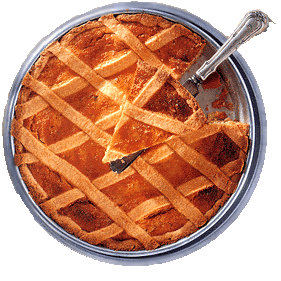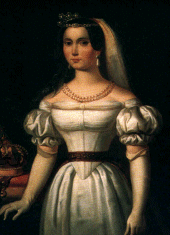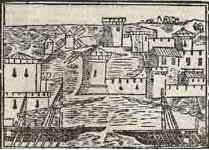"Currite, giuvinò! Ce stà 'a pastiera!"
E' nu sciore ca sboccia a primmavera,
e con inimitabile fragranza
soddisfa primm 'o naso,e dopp'a panza.
Pasqua senza pastiera niente vale:
è 'a Vigilia senz'albero 'e Natale,
è comm 'o Ferragosto senza sole.
Guagliò,chest'è 'a pastiera.Chi ne vuole?
Ll' ingrediente so' buone e genuine:
ova,ricotta,zucchero e farina
(e' o ggrano ca mmiscato all'acqua e' fiori
arricchisce e moltiplica i sapori).
'E ttruove facilmente a tutte parte:
ma quanno i' à fà l'imposto,ce vò ll'arte!
A Napule Partenope,'a sirena,
c'a pastiera faceva pranzo e cena.
Il suo grande segreto 'o ssai qual'è?
Stu dolce pò ghì pure annanz' o Rre.
E difatti ce jette. Alludo a quando
il grande Re Borbone Ferdinando
fece nu' monumento alla pastiera,
perchè facette ridere 'a mugliera.
Mò tiene voglia e ne pruvà na' fetta?
Fattèlla: ccà ce stà pur' a ricetta.
A può truvà muovendo un solo dito:
te serve pe cliccà ncopp ' a stu sito.
Màngiat sta pastiera,e ncopp' a posta
dimme cumm'era: aspetto na' risposta.
Che sarà certamente"Oj mamma mia!
Chest nunn'è nu dolce: è na' poesia!"

THE LEGEND OF PASTIERA
Even more legendary and mythological history of the siren Partenope enchanted by the beauty of the bay, lying between Posillipo and Vesuvius, had fixed his residence there. Each spring, the beautiful mermaid emerging from the water to greet the happy people who populated the Gulf, allietandole with songs of love and joy. Once his voice was so melodious and sweet that all the people they were fascinated and enraptured: rushed towards the sea moved by the sweetness of the song and words of love that the siren had dedicated to them. Thank you for such a great delight, they decided to offer the most precious things they had. Seven of the most beautiful maidens of the villages were responsible for delivering the gifts to the lovely Parthenope: the flour, strength and richness of the country, cottage cheese, compliments of shepherds and sheep, eggs, a symbol of life that is ever renewed, and the wheat , boiled in milk, proof of the two kingdoms of nature, the orange flower water, because even the smells of the earth used to pay homage, spices, representing the most distant nations of the world, and finally sugar, to express the intangible sweetness of Partenope singing in heaven, on earth, and throughout the universe. The siren, happy for so many gifts, sank to return to his home and put down bids precious crystal at the foot of the gods. These, they too intoxicated by the sweetest singing, met and mingled with the divine arts all the ingredients, turning them into first Pastiera surpassing sweetness in the song of that siren
HISTORY OF PASTIERA: It is said that Maria Theresa of Austria, wife of King Ferdinand II of Bourbon, the soldiers nicknamed "the Queen, who never smiles," yielding to the insistence of her husband wag, famous for his gluttony, condescended to taste a slice of Pastiera and could not help but smile, pleased at the good-natured banter of the King who emphasized his obvious satisfaction, relishing the Neapolitan specialty. It seems that at this point the King exclaimed: "To bring a smile to my wife Pastiera we wanted, now I'll have to wait until next Easter to see her smile again."
Maria Teresa OF AUSTRIA
HISTORY IN RHYME PASTIERA
A Napule regnava Ferdinando
Ca passava e' jurnate zompettiando;
Mentr' invece a' mugliera, 'Onna Teresa,
Steva sempe arraggiata. A' faccia appesa
O' musso luongo, nun redeva maje,
Comm'avess passate tanta guaje.
Nù bellu juorno Amelia, a' cammeriera
Le dicette: "Maestà, chest'è a' Pastiera.
Piace e' femmene, all'uommene e e'creature:
Uova, ricotta, grano, e acqua re ciure,
'Mpastata insieme o' zucchero e a' farina
A può purtà nnanz o'Rre: e pur' a Rigina".
Maria Teresa facett a' faccia brutta:
Mastecanno, riceva: "E' o'Paraviso!"
E le scappava pure o' pizz'a riso.
Allora o' Rre dicette: "E che marina!
Pe fa ridere a tte, ce vò a Pastiera?
Moglie mia, vien'accà, damme n'abbraccio!
Chistu dolce te piace? E mò c'o saccio
Ordino al cuoco che, a partir d'adesso,
Stà Pastiera la faccia un pò più spesso.
Nun solo a Pasca, che altrimenti è un danno;
pe te fà ridere adda passà n'at' anno!"


